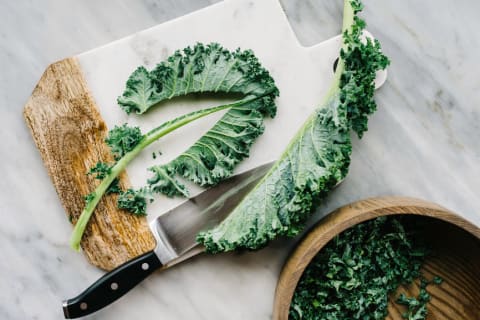Our culture is really uptight about bathroom stuff, but I joke with my clients that having worked in hospitals, I’m pretty much impossible to shock—especially in that realm. If you’ve ever stayed in a hospital, it might have seemed like every person who came into the room wanted to know if you were passing gas or moving your bowels or making urine. They weren’t just being nosy—those are bodily functions that tell us a lot about the state of a person’s health. There are various things that can contribute to gas and bloating, but one big one happens to be a super-healthy food: cruciferous vegetables. Wait, what? Hear me out: I generally encourage eating cruciferous veggies as part of your regular diet year-round, but sometimes when a client wants to cut down on gas and bloating before an event, they may want to take a break for a few days. This doesn’t mean you have to avoid them completely (what could be more festive than roasted Brussels sprouts this time of year?), but being mindful of when you have them and how much can make a difference in how you feel. Cruciferous vegetables include broccoli, Brussels sprouts, cabbage, cauliflower, and kale as well as arugula, bok choy, collard greens, radishes, and watercress, among others. They’re a great source of important nutrients such as vitamins A, C, and K, as well as folate and various carotenoids like beta-carotene, lutein, and zeaxanthin, which have been noted for their antioxidant benefits. Because cruciferous veggies are low in calories but high in fiber, they also may be helpful in staying satisfied and play a role in weight management and supporting stable blood sugar when enjoyed as part of a balanced meal. Phytonutrients found in cruciferous foods have also been shown to reduce inflammation and play a role in cancer prevention. However, they can be difficult to digest and often cause gas. That funky “rotten egg” smell that lingers when you cook them? That’s a result of the sulfur found in these superfoods. Cruciferous vegetables contain glucosinolates, or sulfur-containing chemicals. As glucosinolates break down in the intestines, they form other compounds like hydrogen sulfide, which is why gas passed after eating these foods smells like sulfur. Cruciferous veggies also contain raffinose, an oligosaccharide that humans actually don’t have the enzyme to digest. This means that, since it didn’t get digested in the small intestines, when it enters the large intestine undigested, that’s where you’re likely to experience gas and bloating as bacteria in the intestines start to ferment that undigested food. Find swaps you enjoy. For example, use zucchini noodles instead if cauliflower rice is your stir-fry standby. Instead of a kale or arugula salad, try baby spinach. Because cooking foods can help start to break them down, try cooked versions of your favorite foods. For example, cooked greens may be better tolerated than raw. If you know you’re sensitive either way, keep portions small. Work in some other foods that combat gas and bloating. For example, high-potassium foods like avocado, banana, sweet potato, pumpkin, tomatoes, and oranges are great options. You can also work in some foods with a diuretic effect such as asparagus, beets, celery, and apple cider vinegar. Why not make a delicious spinach salad with beets, avocado, and sweet potato in an apple cider vinegar dressing? Throw in some cucumber, which has been noted for its de-bloating benefits1, thanks to compounds such as silica, vitamin C, and caffeic acid, which help combat water retention. Another delicious choice? How about zucchini noodles in an avocado cashew cream sauce as a filling meal that won’t make you feel uncomfortable. Incorporating soothing foods and herbs like fennel, peppermint, and ginger may also be helpful. Why not sip a ginger or mint tea during the day when you have an evening event? You also want to avoid some other foods that contribute to gas and bloating like carbonated beverages, artificial sweeteners, chewing gum, and high-sodium foods. If you’re lactose intolerant or find that grains or beans cause symptoms, you may want to take a temporary breather.




